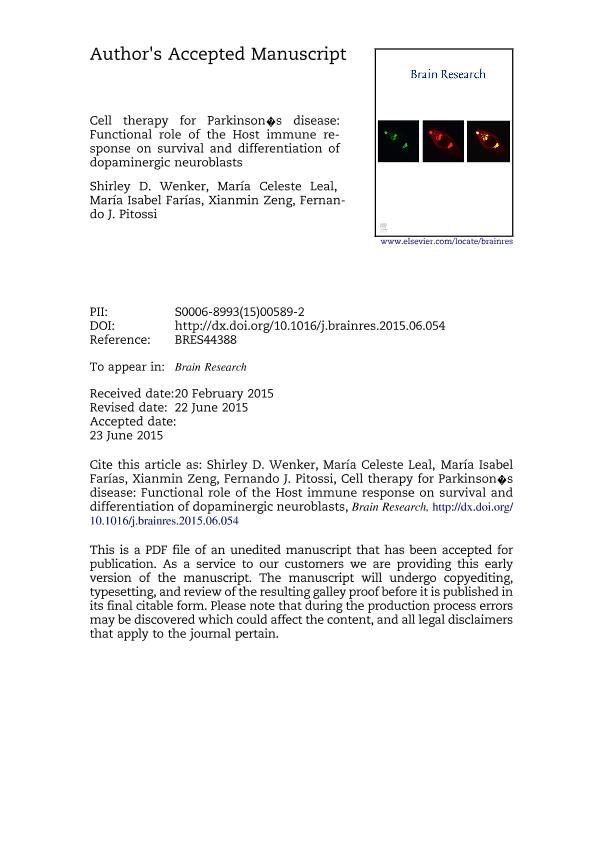Artículo
Cell therapy for Parkinson׳s disease: Functional role of the host immune response on survival and differentiation of dopaminergic neuroblasts
Wenker, Shirley Denise ; Leal, Maria Celeste
; Leal, Maria Celeste ; Farias, Maria Isabel
; Farias, Maria Isabel ; Zeng, Xianmin; Pitossi, Fernando Juan
; Zeng, Xianmin; Pitossi, Fernando Juan
 ; Leal, Maria Celeste
; Leal, Maria Celeste ; Farias, Maria Isabel
; Farias, Maria Isabel ; Zeng, Xianmin; Pitossi, Fernando Juan
; Zeng, Xianmin; Pitossi, Fernando Juan
Fecha de publicación:
08/2015
Editorial:
Elsevier Science
Revista:
Brain Research
ISSN:
0006-8993
e-ISSN:
1872-6240
Idioma:
Inglés
Tipo de recurso:
Artículo publicado
Clasificación temática:
Resumen
Parkinson's disease (PD) is a neurodegenerative disorder, whose cardinal pathology is the loss of dopaminergic neurons in the substantia nigra. Current treatments for PD have side effects in the long term and do not halt disease progression or regenerate dopaminergic cell loss. Attempts to compensate neuronal cell loss by transplantation of dopamine-producing cells started more than 30 years ago, leading to several clinical trials. These trials showed safety and variable efficacy among patients. In addition to variability in efficacy, several patients developed graft-induced dyskinesia. Nevertheless, they have provided a proof of concept that motor symptoms could be improved by cell transplantation. Cell transplantation in the brain presents several immunological challenges. The adaptive immune response should be abolished to avoid graft rejection by the host. In addition, the innate immune response will always be present after transplanting cells into the brain. Remarkably, the innate immune response can have dramatic effects on the survival, differentiation and proliferation of the transplanted cells, but has been hardly investigated. In this review, we analyze data on the functional effects of signals from the innate immune system on dopaminergic differentiation, survival and proliferation. Then, we discussed efforts on cell transplantation in animal models and PD patients, highlighting the immune response and the immunomodulatory treatment strategies performed. The analysis of the available data lead us to conclude that the modulation of the innate immune response after transplantation can increase the success of future clinical trials in PD by enhancing cell differentiation and survival. This article is part of a Special Issue entitled SI: PSC and the brain.
Palabras clave:
Cell Therapy
,
Dopaminergic Neuron
,
Immune Response
,
Parkinson Disease
Archivos asociados
Licencia
Identificadores
Colecciones
Articulos(IIBBA)
Articulos de INST.DE INVEST.BIOQUIMICAS DE BS.AS(I)
Articulos de INST.DE INVEST.BIOQUIMICAS DE BS.AS(I)
Citación
Wenker, Shirley Denise; Leal, Maria Celeste; Farias, Maria Isabel; Zeng, Xianmin; Pitossi, Fernando Juan; Cell therapy for Parkinson׳s disease: Functional role of the host immune response on survival and differentiation of dopaminergic neuroblasts; Elsevier Science; Brain Research; 1638; Part A; 8-2015; 15-29
Compartir
Altmétricas



